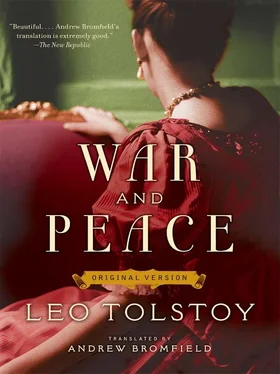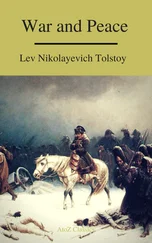“But, my dear Monsieur Pierre,” said Anna Pavlovna, “how do you explain a great man who was capable of executing a duke or, in the final analysis, simply a man, without a trial and without any proven guilt?”
“I would like to ask,” said the vicomte, “how Monsieur Pierre explains the Eighteenth Brumaire. Surely this is deceit? It is cheap swindling, in no way resembling the conduct of a great man.”
“And the prisoners whom he killed in Africa?” the little princess interjected at the same point. “That is awful.” And she shrugged her little shoulders.
“He is a scoundrel, no matter what you say,” said Prince Hippolyte.
Monsieur Pierre did not know whom to answer, he glanced round at them all and smiled, and the smile exposed his uneven black teeth. His smile was not the same as other people’s, which merge into the absence of a smile. On the contrary, when his smile came, his serious, even rather sullen face instantly disappeared and a different one replaced it; childish, kind, even a little stupid, and seeming to beg forgiveness.
The vicomte, who was seeing him for the first time, realised that this Jacobin was by no means as terrible as the things that he said. Everyone fell silent.
“Well, do you want him to answer everyone at once?” Prince Andrei’s voice rang out. “Besides, in the actions of a statesman one should distinguish between the actions of the individual and those of the general or the emperor. So it seems to me.”
“Yes, yes, of course,” put in Pierre, delighted at the support that had been offered him. “As a man, he is great on the Bridge at Arcole, in the hospital in Jaffa, where he offers his hand to victims of the plague, but …”
Prince Andrei, evidently wishing to mitigate the awkwardness caused by Pierre’s oration, half-rose to his feet, preparing to leave and signalling to his wife.
“It is difficult,” he said, “to judge people of our own time, posterity will judge them.”
Suddenly Prince Hippolyte stood up, halting everybody by gesturing with his hands and requesting them to be seated, and began speaking:
“Today I was told a quite charming Moscow anecdote, I simply must regale you with it. I beg your pardon, vicomte, I shall tell it in Russian, otherwise the whole point of the story will be lost.”
And Prince Hippolyte began speaking in Russian with the same accent with which French people who have spent a year in Russia speak. Everyone paused, so keenly and insistently did Prince Hippolyte demand their attention for his story.
“There is à Moscou a certain lady. And she be very mean. She needed have two footmen behind a carriage. And very tall. That was to her taste. And she had chambermaid who was tall also. She said …”
At this point Prince Hippolyte began pondering, evidently struggling to figure something out.
“She said … yes, she said, ‘Girl, put livery on and go with me to carriage to make visits.’”
Then Prince Hippolyte snorted and began to chortle far sooner than his listeners, which was something of a disadvantage to the narrator. However, many of them, including the elderly lady and Anna Pavlovna, did smile.
“She set off. Suddenly strong wind appeared. Girl lose her hat and long hair tumble down all loose …”
Then he could hold out no longer and burst into fitful laughter, and through this laughter he said:
“And so the whole world find out …”
That was how the anecdote ended. Although it was not clear why he told it or why it absolutely had to be told in Russian, Anna Pavlovna and the others were nonetheless grateful for Prince Hippolyte’s courtesy, which had put such an agreeable end to Monsieur Pierre’s disagreeable and discourteous outburst. Following the anecdote the conversation broke up into petty gossip about the next ball and the last, a play, and when and where people would see each other again.

Having thanked Anna Pavlovna for her charming soirée, the guests began taking their leave.
Pierre was ungainly. Fat and broad, with huge hands that seemed to have been made for swinging one-pood weights, he had no idea, as they say, of how to enter a salon and even less idea of how to leave it, that is, of how to make his farewells and say something particularly agreeable before his exit. In addition, he was absent-minded. As he stood up, instead of taking his own hat he grabbed hold of a three-cornered hat with a general’s panache and held it, tugging at the plume, until the general finally requested him with some animosity, or so it seemed to Pierre, to hand it back. But all of his absent-mindedness and his inability to enter a salon and converse appropriately within it were redeemed by an expression so good-natured and open that, despite all his shortcomings, even those whom he had placed in an embarrassing position could not help finding him likeable. Anna Pavlovna turned towards him and, expressing her forgiveness of his outburst with Christian meekness, nodded to him and said:
“I hope to see you again, but I also hope you will change your opinions, my dear Monsieur Pierre.”
To these words he made no response, but merely bowed and once again displayed to everybody his smile that said nothing, except perhaps this: “Opinions are all very well, but see what a fine, good-natured fellow I am.” And everybody, even Anna Pavlovna, could not help but feel it.
“You know, my dear fellow, your way of thinking tends to raise the roof,” said Prince Andrei, buckling on his sabre.
“I don’t mean it to,” said Pierre, lowering his head, peering over his spectacles and coming to a standstill. “How is it possible to see nothing in either the revolution or Napoleon except the personal interests of the Bourbons? We ourselves do not appreciate how much we are indebted precisely to the revolution …”
Prince Andrei did not wait to hear the end of this discourse. He went out into the entrance hall and, presenting his shoulders to the servant, who threw on his cloak, he lent an indifferent ear to the idle chatter of his wife and Prince Hippolyte, who had also come out into the hallway. Prince Hippolyte was standing beside the delightful pregnant princess and staring hard at her through his lorgnette.
“Go in, Annette, you’ll catch cold,” said the little princess, taking her leave of Anna Pavlovna. “It’s settled,” she added quietly.
Anna Pavlovna had already managed to talk over with Lise the putative marriage of Anatole and Lise’s sister-in-law and to request the princess to influence her husband.
“I am relying on you, chère amie,” said Anna Pavlovna, also quietly, “you will write to her and let me know how her father views the matter. Au revoir.” And she left the entrance hall.
Prince Hippolyte moved still closer to the little princess and, leaning his face down to hers, began saying something to her in a half-whisper.
Two servants, one the princess’s and the other his, stood waiting for them to finish talking, holding a shawl and a redingote and listening to their French speech, which they could not understand, but with expressions that suggested they did understand and did not wish to show it. The princess as always smiled as she spoke and laughed as she listened.
“I am very glad I did not go to the ambassador’s,” said Prince Hippolyte, “so boring … An excellent soirée. Was it not, excellent?”
“They say the ball will be very fine,” replied the princess, twitching her lip with the faint moustache. “All the beautiful society ladies will be there.”
“Not all, because you will not be there, not all,” said Prince Hippolyte, laughing gleefully and, seizing the shawl from the manservant, even shoving him back, he began arranging it on the princess. Either out of clumsiness or on purpose, no one could have told which, he did not lower his arms for a long time after putting the shawl in place, and appeared to embrace the young woman.
Читать дальше













